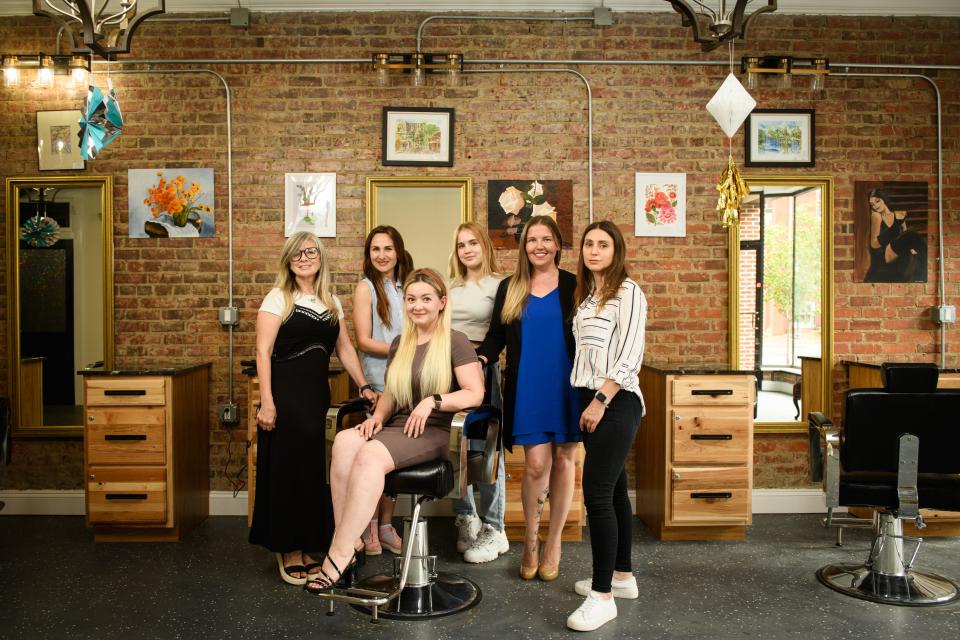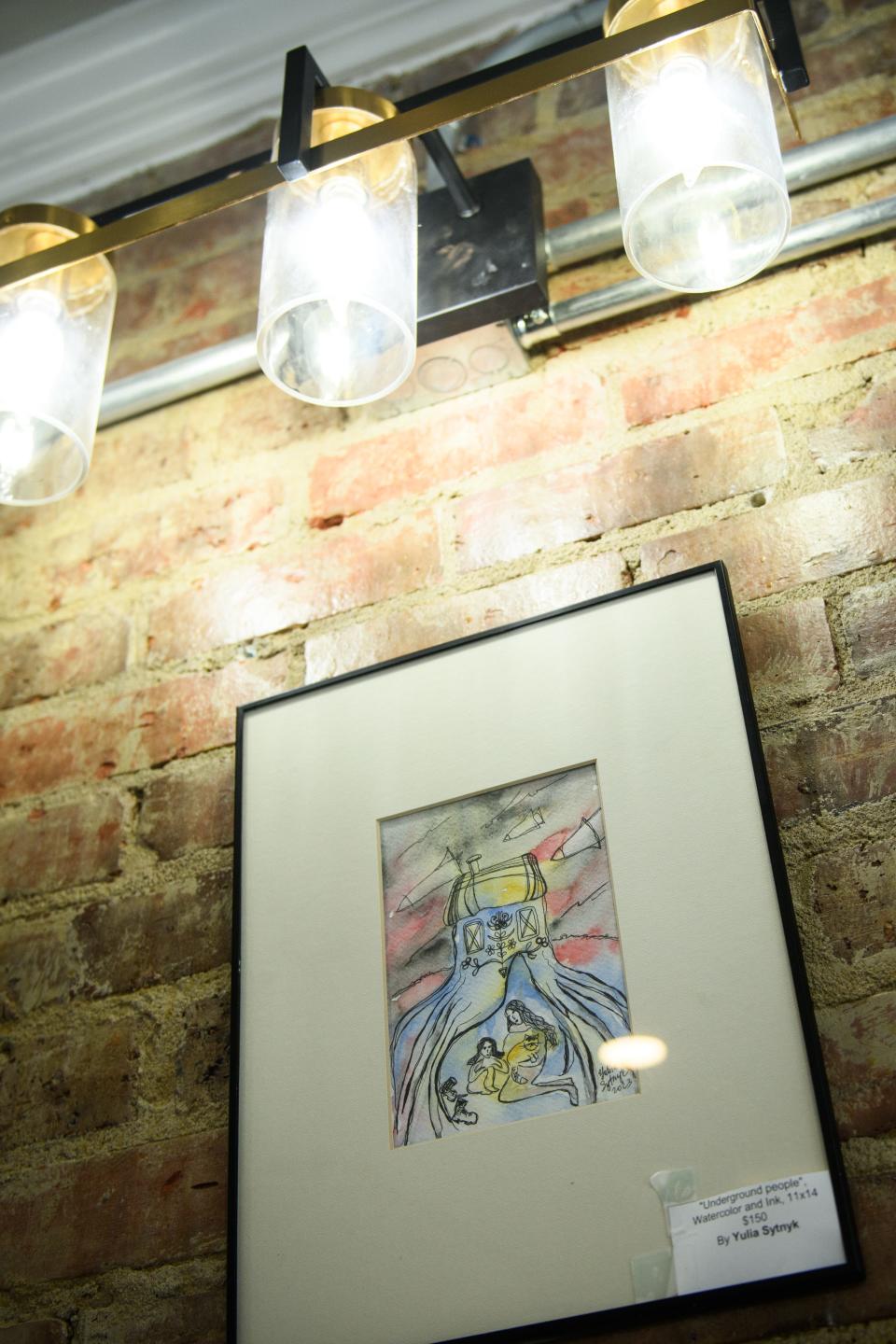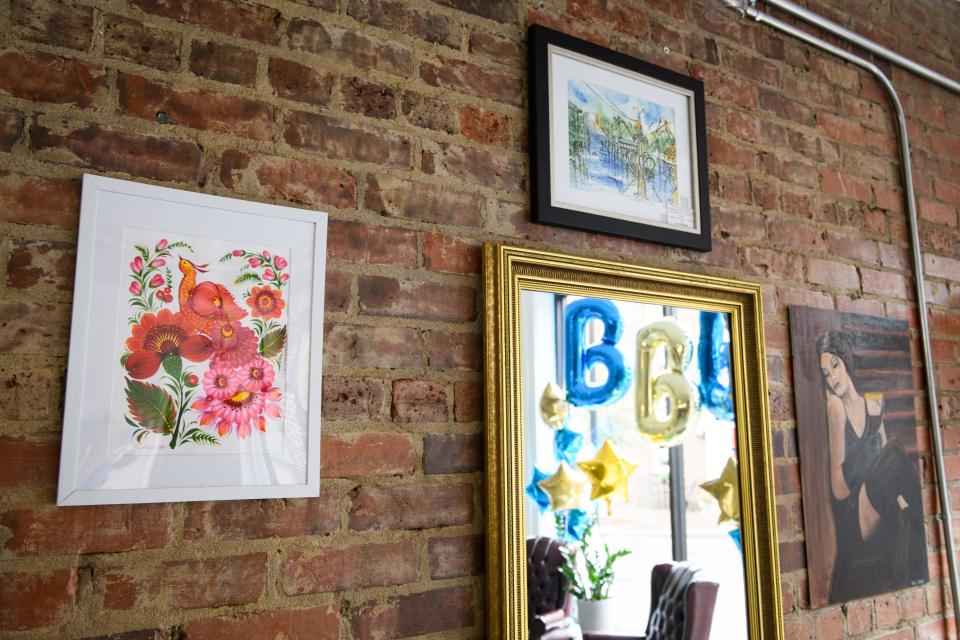A Fayetteville business with a unique Ukraine-Russia alliance. How it happened.
These Ukrainian women work together in a downtown salon on narrow Anderson Street.
I met them there for an interview.
Olga Seryodkina does eyebrows and permanent makeup.
Ksenia Afanasieva does nails, and Nataliia Kurylo does eyelash extensions and can also do keratin hair extensions. Diana Bagwell repairs clothes and does alterations. She is the one always at the shop. The other women work by appointment.
They have all fled the Russian invasion of Ukraine and have started over in the United States.

In Fayetteville, they have a seemingly unlikely ally: Russian native Alena Barosa. She is the founder of the Barosa Learning Lab, which offers services to people who are neurodiverse, or who have different learning styles.
Barosa also has numerous ties to the Ukrainian community in Fayetteville, through her close friendship with a local Ukrainian couple and her involvement with a nonprofit that raises money for Ukrainian relief.
More: 'We don’t have to deal with bureaucracy': How Fort Bragg soldier helps fellow Ukrainians
More: Myron B. Pitts: Ukraine never far from Fayetteville man’s mind
She was there to help the women open the shop on April 26. She also helps them with come what may.
Barosa and the women agree on the main aspects of the war. They believe Vladimir Putin’s Russia is the aggressor.
Most of the Ukrainian women from the shop lived in or near Kyiv, the first major target of the Russian army.
“She lived close to the military installation," Barosa says about Kurylo. “She heard everything and saw everything there.”
I could only imagine.
Best friends
The shop’s name can’t be beat considering its origin story: “Beauty Beyond Borders.”
That story started with a close friendship, between the sons of Barosa, a single mother of an 11-year-old, and Dmitry and Alena, who are Ukrainian. (Their last name is withheld because of Dmitry's active-duty role in Special Forces.)
Barosa describes the sons as best friends.
“So when the situation was escalating between Russia and Ukraine, we kind of kept discussing it,” she says.
None of the adults thought war would happen.
Then in February 2022, Russian forces attacked.
“I mean, the first reaction was embarrassing,” Barosa says. “OK, I was so embarrassed and then I started calling my family.”
She asked them if they were seeing what was happening.
She says she was told, “Yeah, because there’s Nazis in Ukraine, of course we have to do it.”
Says Baroso: “That's when I realized, like, my family has gotten brainwashed.”
She cannot discuss the war with them now.
But she knew she would have to keep discussing it with her son.
“I had to wake up and explain to my kid how my people attacked his best friend.”

‘Anything that you can imagine’
Within days of the war’s beginning, Dmitry, Alena and Barosa had organized a nonprofit, Ukrainian Efforts Humanitarian Fund, to get needed supplies to Ukraine. Dmitry is an instructor who trained Ukrainian soldiers here at Fort Liberty before they were called home to defend their country.
So he had many contacts and family members of contacts ready to receive goods. One advantage, Barosa says, is that supplies could be tracked more reliably than donations that go through agencies like the Red Cross.
People, Barosa says, “started bringing a whole bunch of stuff. So a whole bunch of many, many duffel bags went to Ukraine.”
The duffels were loaded. Barosa says: “Tourniquets, first-aid kits, Band-Aids, field gear, clothing, socks, underwear, things like that, tactical items So anything that you can imagine those Fort Bragg soldiers had in their garage and they never had to return.”
The nonprofit reports supplying more than $6 million worth of supplies, working with active-duty soldiers, the community and small businesses, Barosa says.
Meanwhile Dmitry and Alena over time have sponsored 17 Ukrainians who have made their way to America. They bought the building at 122 Anderson St. downtown, a former Farmer's market, for the salon, which also showcases Ukrainian artists on its brick walls.

‘How are you doing?’
Bright light filtered through the salon this past Friday as I talked to the women in the shop. They sat around a stylist's station, in various poses of relaxation: Olga Seryodkina perched straight but serenely on her chair, for example, and Nataliia Kurylo, who leaned into the counter, elbows atop.
Their English is in various states of proficiency, but when they have a longer message to convey, they trade Russian with Barosa, and she tells me what they say. It is explained to me that Ukrainians learn both languages because official business in Ukraine is conducted in Russian.
Learning English has been their biggest challenge in America. They take classes at Fayetteville Technical Community College and use apps like Duolingo.
Kurylo laughs as she says that for a long time, she thought when people said to her, “How are you doing?” or “How’s it going” they really wanted an answer. They would walk on by as she started to tell them about her day.
Co-parenting
Meanwhile, the women in the salon are living their lives, as they keep up with relatives back home through apps such as WhatsApp and Telegram.
The salon has booths for rent and is actively searching for barbers and stylists.
“They are very friendly and open and they will feed you,” Barosa says.
Diana Bagwell, the youngest, has been married for right at a year. She holds up her ring finger, breaking into a wide smile.
Many Ukrainians sponsored by Dmitry and Alena initially live with the couple until they get their feet under them, Barosa says.
Olga Seryodkina rents her own place from the couple; Ksenia Afanasieva lives with her significant other. Kurylo, who has a five-year-old daughter, lives with Barosa and her son.
Barosa has fostered children and is use to having people stay with her family. She says having two moms is in some ways easier.
“We’re just like co-parenting,” she says with a laugh about Kurylo.
Young believers
As I am putting away my laptop and notebook, Afanasieva, who had not had a lot to say during the interview, gets Barosa’s attention and begins speaking in Russian with her. She wants to make sure I understand a couple of things.
First, that she and the other women are grateful to be here in the United States.
I smiled.
I know.
The second thing she wanted me to know, according to Barosa: “She’s saying that her daughter and her daughter-in-law are purposefully remaining in Ukraine because they believe that Ukraine will win. She already had two grandkids born during the war who she’s never really seen.
“The young ones over there still believe really strongly.”
Opinion Editor Myron B. Pitts can be reached at [email protected] or 910-486-3559.
This article originally appeared on The Fayetteville Observer: Fayetteville, NC, salon: Where a Russian and Ukrainians come together